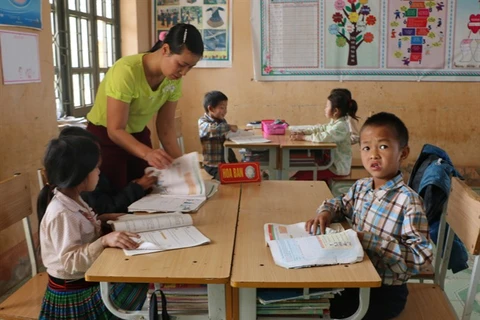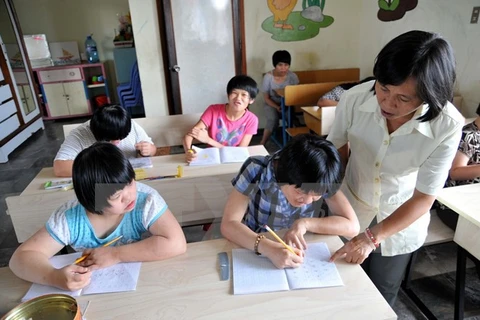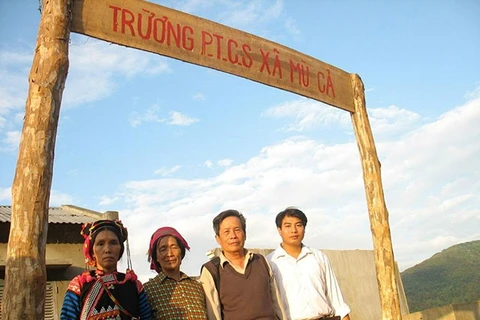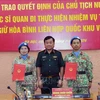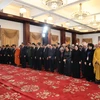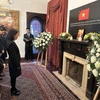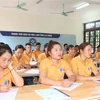Nghe An (VNA) - Since its establishment in 1982, no female teacher has worked at a primary school in the central province of Nghe An because the working conditions are very difficult. The dedication of male teachers saves the day, Minh Duc reports.
The Tri Le 4 Primary School is an educational institution like no other in the country.
Thirty-five years since its establishment in the central province of Nghe An, it does not have single female teacher. To say that this is highly unusual, especially for a primary school in a rural area, would be an understatement.
But the reason is very simple. The conditions are too difficult for women to manage.
Located in Tri Le commune, the school has 44 male teachers aged 24 to 60, who take turns teaching classes in six villages. The village schools, are located near the residential areas of locals, mainly members of Mong ethnic group.
From the commune’s centre to the schools, the teachers have to ride around 40km on motorbikes, of which just 10km are paved. The rest of the way is a muddy path that comes very slippery on rainy days. They always go in group to help each other on the way.
On rainy days, they have to carry the bikes to overcome the slippery parts. It is normal that many slip and fall, despite being careful.
What is heartening and amazing is that despite the hardships, the teachers encourage each other and continue teaching to their beloved students.
The Huoi Moi 2 School in the hamlet of the same name has perhaps the worst conditions in Tri Le commune. It has 60 students from the first to the fifth grade. Mong kids from 10 different mountain villages, some located 10km away wake up at 4am and traverse mountain paths and wade through streams to get to school.
“The distance is not long, but it takes one to three hours to reach, depending on the weather,” said Luong Ngoc Xuyen, a member of the Thai ethnic minority, who has taught at the school for four years.
Due to the extremely difficult road conditions, only physically fit male teachers can work here, although some female teachers are keen on the job.
Xuyen said even male teachers find it difficult to travel by motorbike to this school. “Our strength quickly fades. Sometimes I feel I’m not strong enough to steer the motorbike.
“My motorbike has to be repaired once or twice a month. Many parts quickly wear out. Every two months, I have to change the tires, rims have to be replaced constantly.”
Actually, it has only been four years since the teachers are able to ride motorbikes to the Huoi Moi 2 School. Before, they had to trek on a narrow path.
Here, there are no roads, no electricity, no Internet, no clean water. To make a phone call, the teachers must walk 3km up a steep hill to catch the signal. When it rains all weekend, the young teachers must stay at school, taking turns picking vegetables, gathering bamboo shoots and forest banana stalks, and catching fish.
At night, they prepare for the next day’s lessons in the light of an oil lamp.
Lang Van Nhan, headmaster of the Tri Le 4 Primary School, said the teachers don’t just suffer poor living conditions, they are also emotionally deprived a lot of the time. They live far away from home. Some of them have actually chosen to remain single.
“The teachers can visit their families once or twice a month if the weather is fine,” said Nhan. “In the rainy season, the commune is isolated by floods and the road is totally unusable. Then they can’t go home for several months.”
Nguyen Hong Hiep, 36, has taught at the primary school for 15 years. He admitted that there have been times he wanted to give up because he missed his family and two children.
“I’m a teacher but I can’t teach my children any lessons. My wife and grandparents take care of them. Sometimes I feel sad and homesick.”
However, the teachers also have harbour love and compassion for the poor students in the remote area, and this is what helps them deal with all the obstacles. That, and their shared passion for teaching keeps them going.
The men provide motherly care for the students, teaching them personal hygiene along side reading and writing.
“I teach the children from the first grade because I know both Vietnamese and the local ethnic languages, because sometimes, the children can’t understand Vietnamese,” said Tho Ba Tru.
“Teaching them to speak, sing, read, and write is quite difficult. They come in knowing nothing wearing ragged dirty clothes, and come to school with dirty hands and feet. We teach them how to dress neatly and wash their hands and feet. When they first came to school, they played as if they were at home. They had no idea about learning.”
The teachers’ reward is increasing recognition among the parents of the importance of learning and giving the children an education. Before 2000, the number of students was very small, mostly boys. The parents didn’t think that girls also need to go to school.
Now, there are 145 students at the Huoi Moi 1 School, evenly divided between boys and girls.
The fruits of their labour become even sweeter for the teachers when students grow up, study further and return to the village to teach younger generations.
The teachers’ devotion was formally recognized and awarded this year at the VTV Awards 2017, an annual event organized by Vietnam Television.-VNA
VNA

